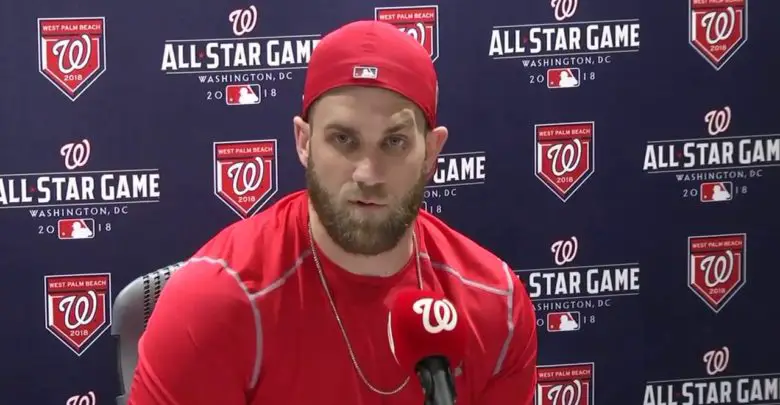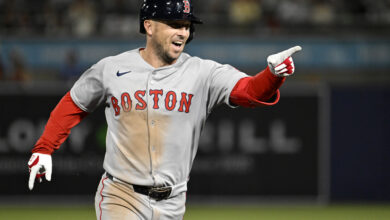
Report: Cubs Asked Bryce Harper to Wait for Them, Budget May Not Be Governed by Luxury Tax
Even with the Dodgers moving salary and outfielders around to clear space in different areas, the consensus is that Bryce Harper isn’t making any decisions until well into the new year. Not only has Manny Machado reportedly informed interested teams that he’s not announcing his choice until January, the Dodgers may have been making room for entirely different targets than Harper (namely Corey Kluber and AJ Pollock).
That bodes well for the Cubs, who may have met with Harper and Scott Boras for as long as three hours during their clandestine summit at the Winter Meetings in Las Vegas. Sources had told Cubs Insider that Harper’s preference is to play for the Cubs and that he wanted to wait to see if they could make their own moves to clear the requisite salary to present a viable offer. As it turns out, Harper may be of that mind at the Cubs’ request.
That comes from Gordon Wittenmyer of the Sun-Times in a column about the state of the NL Central and how the Cubs are or aren’t keeping pace. Even with expected improvements in the health of several key players and better performances from others, the moves made by the Cardinals and Reds alone could mean fewer wins for the Cubs. Then you’ve got the division-champion Brewers to contend with.
It’s entirely possible the Cubs can stay atop the division with nothing more than positive regression on their side. But a big move for a player of Harper’s caliber would install them as the odds-on favorites to regain their dominance. Only trouble is, gee whiz, such a pursuit might be a pipe dream. Despite all their public claims of abiding by a budget, though, the Cubs aren’t giving up on a huge addition.
Sources say Epstein urged them to wait before accepting an offer from another team until the Cubs had a chance to try to move some payroll off the books and check again with ownership.
Speculation as to exactly how they’d be able to move that payroll has centered on Jason Heyward, with Ben Zobrist as another, even more unlikely, possibility. Speculation as to exactly why they’d need to shed salary is another matter entirely, especially when we’re talking about a Cubs team that isn’t hurting for revenue and should see a massive influx with a new broadcast deal around the corner.
All the talk of budget constraints seems to run contrary to Theo Epstein’s claim that the front office would spend all its energy fixing what broke with the offense in 2018. And while he didn’t say they’d spend a bunch of money in that effort, the understanding that they’d increase payroll markedly was more than tacit.
Both words and actions this winter have said otherwise, since Epstein’s budget was set after he made those bold statements in his postmortem presser. But as much as people have talked about staying under the upper levels of the competitive balance tax penalties, it may not be a few extra million in surcharges that Cubs ownership is worried about.
And indications are the restraints are less about luxury-tax penalties, which the Cubs reset by staying under the thresholds the last two seasons, than whatever bean-counting calculus ownership and the business-operations department are using to set budgets.
Wittenmyer didn’t specify what went into that calculus, though there are many different patterns one could discern by connecting myriad dots related to the Ricketts family. Between the quickly-denied reports of a deal with Sinclair for broadcast rights, emails obtained by Splinter that detailed a family constitution and plans to cultivate and maintain generational family wealth, and obvious desire for continued political influence, it’s easy to come up with all kinds of ideas.
One source even told CI that Todd Ricketts might be eyeing a run at the Illinois governor’s seat in four years. That’s a long way off, but JB Pritzker doesn’t present a daunting target and the Ricketts family has shown itself to be both willing and able to play the long game in matters both domestic and financial (not that there’s much difference to them). That’s obviously very speculative at this point and may never come to pass, though it’s hard to imagine Cubs fans being very pleased with even a whiff of the team limiting payroll in order to fuel political aspirations.
But none of that would come to fruition for a while, if it does at all, so just stick it in your back pocket or dismiss it as tinfoil-hat conspiracy. It’s perhaps more likely that investment into Wrigleyville’s rampant gentrification hasn’t returned, or isn’t projected to return, quite as much revenue as initially believed. And perhaps the broadcast deal is going to be less lucrative than first speculated. Whatever the case, let’s turn back to Harper here to close things out.
Epstein had to work out some concessions from the business side back in 2015 prior to making a splash for Jon Lester, a move that jump-started both the Cubs’ competitive window and their flood of new revenue. The same was somewhat true last winter, when another series of player expenditures resulted in Yu Darvish, Tyler Chatwood, and Brandon Morrow, none of whom had quite the same impact as Lester.
Boras is touting Harper as the kind of generational talent who could instantly increase the value of his new organization. The former National would be worth far more than even the record-setting contract he figures to earn, or so his agent holds. Might Epstein leverage that rationale in an attempt to loosen the Ricketts’ purse strings for a big expenditure on Harper, something “rumblings” in Vegas had said ownership was open to?
Who knows, as this situation seems to have gone in several different directions so far. The one thing all the various speculation, rumors, and reports seem to have in common, however, is that the Cubs look better the longer it all drags out. Well, they look better when it comes to their chances of landing Harper. The same can’t really be said for the rest of their PR efforts.

